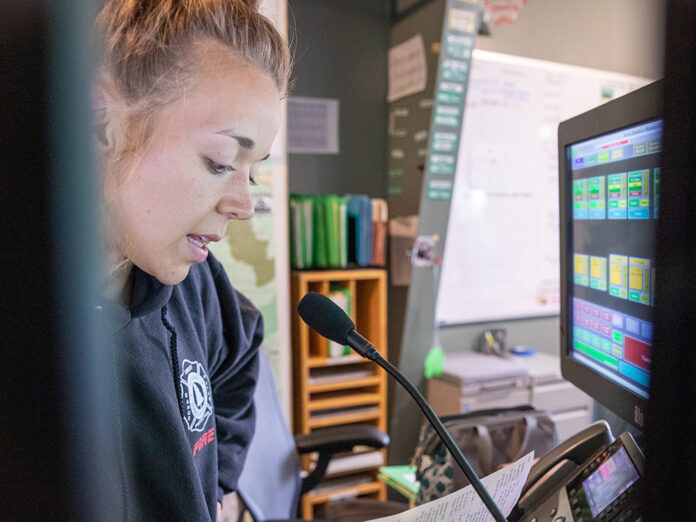
By Elliot Sneezy
The City of Maricopa Police Association (COMPA) stands with the Fraternal Order of Police Lodge 78 in support of opposing the closure of the City of Maricopa’s Emergency Communications Center (ECC). We believe closing the EEC will be catastrophic.
The City of Maricopa Police Association is a local associate organization of the Combined Law Enforcement Associations of Arizona (CLEAA) – a statewide police organization made up of law enforcement associations from across the state of Arizona. COMPA has represented sworn police officers and other members in law enforcement since 2007.
RELATED COVERAGE
City evaluating 9-1-1 call center partnership with Chandler
City Manager: Challenging the status quo
We have been monitoring and keeping up to date with the city conducting a study on the dispatch center, reading letters from the FOP, the city manager and statements made in the media. The removal of the City of Maricopa’s ECC is focused on financial costs and not how it affects the safety of our police officers and the citizens of Maricopa.
In 2007, Maricopa Police Department (MPD) began policing the City of Maricopa being dispatched by Pinal County Sheriff’s Department (PCSO). In 2013, the Buckeye Police Department took over dispatching for MPD. Both agencies are good agencies, but they also have their own ways of dispatching along with different policies and procedures that work for them.
When the police department took over the city from Pinal County, being dispatched by PCSO was the best choice at that time because MPD was not a 24-7 agency. Pinal County dispatchers knew the area of the City of Maricopa and assisted our officers. Anyone who knows law enforcement understands the differences between county and city policing because of jurisdiction, policy and procedures. Our struggles between both agencies were not for the lack of trying but mostly because of city activity, policies and procedures versus county activity, policies and procedures.
We basically gave PCSO dispatchers more work for the same pay. Unfortunately, some of the dispatchers were not happy especially when we became busier with calls. To be fair, not all the dispatchers were unhappy, but the ones that were made policing difficult. When complaints were made about the level of service provided, the complaints were either watered down or forgotten.
MPD asked Buckeye police to dispatch because they had a similar computer-added dispatch (CAD) system, similar policy and procedures, and were cost effective. Unfortunately, some of the same incidents reoccurred while being dispatched by Buckeye police. This resulted in low morale and poor response times. Buckeye dispatchers did not know locations in the city and those who were vested did numerous ride a-longs to try and learn the area.
Again, we gave Buckeye dispatchers more work and asked them to dispatch for whole new city for the same pay. A lot of dispatchers were not happy. However, not all dispatchers were unhappy with us, but the ones that were made policing difficult for our officers and the public. Complaints about the level of service only went so far before they were dead in the water.
I have been in law enforcement for over 27 years and have worked for two other agencies prior to the City of Maricopa. One of the agencies I worked for moved to a regional dispatch and both police and fire from the same city were dispatched by them. To have a metro agency in another county dispatch our fire department while another metro agency dispatches the police department does not make sense.
The EEC we have now is already built and operational near Copper Sky. The dispatch center is not in the main station and is operating fine. The building and the property is located on prime real estate. It is understandable as to why the EEC needs to be moved but outsourcing outside the city and county is only going to make operations complicated and delayed.
The Arizona Department of Public Safety is pushing for dispatch consolidations and will more than likely not fund our dispatch to reopen if things do not work out in Chandler. But to be clear, Chandler Police Dispatch is not a regional dispatch and should not be thought of or presented as one. Most regional dispatch agencies will use surrounding agencies that commonly work together. When emergencies arise in the City of Maricopa, MPD commonly calls PCSO, AZDPS, Ak-Chin police, Gila River police and Casa Grande police. MPD has never had to call Chandler police to back us up on a call.
Fire departments do not worry about jurisdiction issues like law enforcement does, especially when it pertains to enforcing laws. Our experience with Maricopa Fire being dispatched by Phoenix is often hit and miss when we are providing unusual locations. Places like, the north wash in Rancho, newly built homes, farm roads or roads that have not been updated on maps often take longer to find. It gets more complicated when MPD assists other agencies outside the city and needs our Fire Department to respond.
Recently, MPD responded to an overdose subject in the city and had to call an outside fire agency to respond to the officer’s location. The fire department could not locate the address because the call was in an area that did not have a specific address. Fortunately, MPD temporarily revived the subject with Narcan until the fire department arrived. The fire department still took an extended amount of time because its dispatch and fire crew did not know the city.
Regional Wireless Cooperative (RWC) provides a better transmission because it is digital. A lot of agencies, including Maricopa and Chandler, have switched to RWC because of its clarity. However, even though Pinal County, Ak-Chin, Gila River and Casa Grande Police are not on RWC, we are still capable of working with them. MPD participates in task force operations outside the city in Pinal County. Some of those task forces involve federal agencies who do not have RWC. Will Chandler Dispatch be dispatching for our officers during task force deployments, or will we have to borrow radios from other agencies? If MPD continues to participate in these task forces or specialty units, the officers’ radios should be programmed to communicate with the agencies in Pinal County.
Dispatchers are the most overlooked and underappreciated employees in the city. On top of dispatching, they act as Records Clerks since our Records Department is not a 24-hour operation. Last month, we celebrated Telecommunications Week to show appreciation for our dispatchers. This month, a study is being done on our EEC and dispatchers by people who are not vested in the city. Morale for dispatchers and officers at MPD is low due to the possibility of closing the EEC.
Even though all this is going on, our dispatchers and officers have remained dedicated to the citizens of the City of Maricopa. Our dispatchers are true professionals and care about everyone’s safety and well-being. I tip my hat off to them because they know their job could end on any given day, yet they are still dedicated, loyal and provide our police officers and citizens with excellent service.
In closing, the City of Maricopa is located between two sovereign tribes and is in Pinal County, which makes this area unique. If a regional dispatch is sought after, then maybe the City of Maricopa should lead the county by investing in one in the city and getting other agencies in the county on board instead of following another city agency in a totally different county.
If you have any questions, feel free to contact me at 520-705-3807.
Elliot Sneezy, a sergeant in the Maricopa Police Department, is president of the City of Maricopa Police Association (COMPA).







![MHS G.O.A.T. a ‘rookie sleeper’ in NFL draft Arizona Wildcats wide receiver Jacob Cowing speaks to the press after a practice Aug. 11, 2023. [Bryan Mordt]](https://www.inmaricopa.com/wp-content/uploads/2024/04/cowing-overlay-3-218x150.png)




![Alleged car thief released without charges Phoenix police stop a stolen vehicle on April 20, 2024. [Facebook]](https://www.inmaricopa.com/wp-content/uploads/2024/04/IMG_5040-218x150.jpg)




